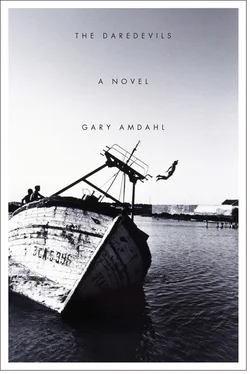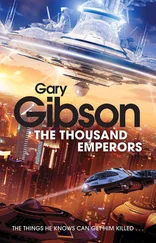“It is not nearly so large as a threshing machine,” said Father reprovingly. “It is a toy compared to a threshing machine.”
“And yet how many times more powerful than a horse!” shouted Sir Edwin.
“It is,” Charles said, “slower than a horse, and ungainly. You might get around town just as easily in a threshing machine.”
Sir Edwin began to speak English and turned to the weather, which, though of course mild, was nearly unbearable for one as unwell and raggedly worn as himself, who frankly admitted he had sacrificed his manly vitality for his art.
“Don’t think I don’t regret it,” said Sir Edwin.
“You regret it, do you?” asked Father.
“I do.”
“I don’t believe you.”
“Lucky for me, I don’t give a damn what you believe!” shouted Sir Edwin, loudly, more loudly, perhaps, than he’d thought he would. He was so tired he thought he might become delirious.
“You can’t have it both ways,” said Father. He was amused by his wife’s artist, his son’s artist, for God’s sake, but this amusement was mitigated by a general distaste for people who boiled over too easily, like spoiled horses, and who thought it was all right because they were thoroughbreds. He felt as well the strong man’s increased desire to defeat a weaker man once that weaker man has displayed the weakness and its probable trajectory toward greater weakness — if he could use such a term, he did not like it at all, but how else might he put it — decreased vigor? Increased vulnerability? Fever? Nausea? Infantile impotence? Terror?
“Both ways? Describe, please, these two ways which are no longer mine.”
“Soulful visionary and virile man of consequential action.”
“I was encouraged in my youth, it is true, to think that the artist was like no man so much as a religious martyr, the practical consequence of which was the subtle but steady wasting of my resources and the silent but insidious ravaging of my health. But I am making up for it now with the vivid, vital violence. that only the mortally wounded. apostate anchorite is capable of.”
Sir Edwin was very pleased with his speech, but was not quite finished. Trembling with vengeful glee, he thrust his ace in Father’s face: “And besides, I have your son to do my living for me.”
Father smiled patronizingly and shook his head. “You have no such thing,” he said in seemingly gentle reproof. “Charles is enrolled in your little kindergarten here of public performance, but will soon be moving on. He has real work in Minnesota in the fall. The Commission of Public Safety.”
“You won’t,” asked Keogh, “be going ‘over there’?”
“He will be going over there by staying here. There is a formidable enemy here as well. I’m sure I don’t have to tell you so.”
“Terrible news, however the situation stands, about your theater,” murmured Keogh. Something in his tone of voice, however muted and drawling it was, alarmed Charles and caused him to look directly into Keogh’s eyes. The penetration was allowed for a moment. Keogh then smiled and turned to Amelia.
“We want,” he said, “to help in any way we can. Of course with money, but publically, morally, we want to do everything that can be done to help bring a patriotic show like The American to its rightful audience.
“They are saying now—” Amelia began.
“ Who is saying now?” interrupted Mother. “Who is saying what now?”
“It was a small fire, I am told,” said Father. “Easily contained and causing little damage. Everything can be quickly and easily replaced.”
“That is excellent news,” said Keogh, smiling at one and all.
“A boy was killed,” said Charles.
“—that it was deliberately set,” Amelia continued, picking up the controversy of the earlier strand in the conversation left dangling. “The fire marshal believes a small explosive device was launched by a cadre of anarchists under cover of the fireworks display — that is to say, by one of them, a crack archer who used a window purposefully left open as his target. And yes, that a child was killed makes the investigation far more important than it might have been, Father.”
“I left the window open,” Charles said. “And the arrow came through a window that wasn’t open.”
Father nodded, but nobody really cared very much about that sort of detail.
And so Charles sat on the blanket feeling weak and stupid and cold, shivering in the ridiculous details of a political melodrama he could only just barely stand imagining, while some of Captain Keogh’s horsemen twits dug small holes out in the field and Amelia — to his great surprise on her favorite horse, Jolly — barrel-raced around them. Drinking wine one glass after another, he dozed off, and woke to cheering. A horse and rider went thundering past, the rider hanging off one side of his mount and snatching something from the ground and hauling himself back upright in the saddle. There had been a strange sound and a spray of dirt. Another horse and rider appeared at the far end of the field. They galloped past and again the rider hung off low to the ground like an Indian, snatched something that made a small explosion, and rode off shaking his prize. “What are they doing?” he mumbled. Father shaded his eyes and looked down at him. He was insubstantial in the overpowering light. Charles repeated the question, sitting up dizzily and shading his eyes too.
“You know very well what they’re doing,” said Father. “It’s traditional amongst cavaliers,” he said. “An exercise in. in. ”
“What is?” Charles asked, standing unsteadily. “What is an exercise in what?”
Charles looked over at Sir Edwin and told him that chickens had been buried up to their necks. Horsemen rode by and snapped their heads off.
“Ah,” said Sir Edwin.
“This isn’t a war they’re preparing for,” Charles went on equably, “it’s a joke. It’s pitiful, really.”
“If you can’t enjoy the day, why don’t you go home,” suggested Father. “And shave. You look like a bum. A drunken bum.”
Cheers from the far end of the field made their way down the field as another rider charged toward another chicken. People were shouting now and laughing. Charles could see heads turning up and down the field. He lay back down and closed his eyes to the sun, lids burning blood-red and luminous, brain hot in a cold head and reeling. He put his hands over his eyes just as Mother softly exclaimed that, oh, it was Amelia. And there she was, Charles’s mad saint sister like an Amazon Godiva, long chestnut hair in streamers behind her, hanging low and bounding off Jolly’s flank, his spotted coat brilliant in the intense sunlight, his great crazy head nodding rhythmically as he charged. Knowing it was a chicken buried there, he now saw it, its ridiculous startled head straining upward, jerking left and right as it fought off both sleepiness and fear, and then gone, appearing before Charles and Sir Edwin dripping in Amelia’s glove in much less time than Charles thought possible, Jolly reined up in front of the family, Amelia laughing hysterically, laughing and laughing and laughing, infectious but frightening, Mother and Reverend Ruggles both rising to steady her, laughing a little themselves too, helplessly, but wanting to calm her before something happened. But it was too late and Charles knew it. She flung the bloody scrap of chicken head at Sir Edwin. It landed on Charles’s stomach. After a moment, he daintily plucked it up and laid it aside. Then he stood and removed his vest and listened to Amelia sputter and whinny, his little brothers shriek with pleasure, and Mother say to Father that that was it, that was enough, it was too much, we’ve got to get everybody out of here.
Читать дальше












